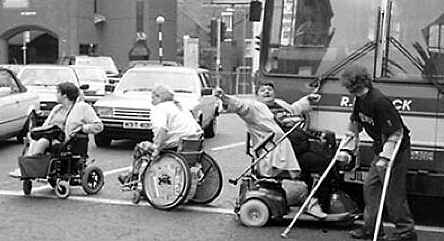






See listing of Recent and Most Popular articles on the Home Page
Connections
Category: Relationships / Topics: Civility • Compassion • Relationships • Social Issues
Worthy as a Person
by Ken Potts
Posted: April 19, 2020
People with disabilities shouldn't be considered invalid…
What gives us validity or worth as a person?
Earlier this year, a close friend and I sat over breakfast discussing his upcoming surgery. Though fairly routine (if any such invasion of our bodies can be routine), there was also the slight possibility that a permanent disability might result, that my friend might become an invalid to some degree.
"You know," he mused, "the noun 'invalid' and the adjective 'invalid' are the same words."
The conversation came to a dead stop. I'm not sure either of us had ever realized the power of that connection. "Invalid&kdash;a chronically ill or disabled person." "Invalid—unsound, ineffective, useless, worthless."
Language is more than simply the hows and whys of stringing sounds together so as to communicate with another person. Language is shaped by, and itself shapes, a society and its people.
Invalid—does the noun imply the adjective? Do we see persons who are chronically ill or disabled as being unsound, ineffective, useless, worthless?
The answer, I'm afraid, is often "yes." The developmentally disabled, the wheelchair bound, the visual- or hearing-impaired, people with epilepsy, and on and on—are seen sometimes as less than complete people, and somehow having lost validity.
I don't like thinking that. I don't like writing it. But as I look at the society we live in, it does seem to be true.
Our heroes are seldom handicapped. And when they are, we tend to make them "super human," rather than simply accept their humanity, their basic sameness to you and me.
Employers tend to look askew at job applicants with disabilities, even when those disabilities have nothing to do with the job for which the person is being considered. And when a person with disabilities is hired, it is somehow a "special" act of good will on the part of the company, rather than simply hiring the most qualified person.
Even in our relationships, we tend to diminish the potential for closeness of those who are chronically ill, disabled, etc. Again, it is as though we assume their difference has somehow robbed them of their ability to give and receive the love which all persons seek.
Why do we do it? Maybe part of it has to do with just not wanting to deal with reality. Most of us would rather live in a world where illness, disabilities, etc. did not exist. And being around people who testify to the reality of such "imperfections" not only forces us to deal with a less than perfect world, it also makes it difficult for us to avoid confronting our own fragility and mortality—the fact that any one of us can become an invalid. That's not a comforting thought.
Yet another factor, I think, is our difficulty in dealing with feelings. We experience a number of often conflicting emotions when we encounter someone who is ill or disabled—sympathy, concern, fear, sometimes even revulsion.
We may want to offer our help, but don't know how to do so. We assume such persons are emotionally fragile and we're afraid of upsetting them. Or perhaps we are aware of and fear our emotional frailty and fear our own upset.
Despite our prejudices, our uncomfortableness, the chronically ill or disabled are anything but invalid. They are people who work, who love, who laugh and cry, who are human. And, they are people who have worth.
Invalid? Perhaps. Invalid? Hardly.
Search all articles by Ken Potts
Dr. Ken Potts is on the staff of SamaraCare Counseling Center in Naperville and Downers Grove, Illinois. • E-mail the author (gro.gnilesnuoceracaramas@sttopk*) • Author's website (personal or primary**)* For web-based email, you may need to copy and paste the address yourself.
** opens in a new tab or window. Close it to return here.
Posted: April 19, 2020 Accessed 240 times
![]() Go to the list of most recent Connections Articles
Go to the list of most recent Connections Articles
![]() Search Connections (You can expand the search to the entire site)
Search Connections (You can expand the search to the entire site)
![]() Go to the list of Most Recent and Most Popular Articles across the site (Home Page)
Go to the list of Most Recent and Most Popular Articles across the site (Home Page)
 Loading requested view...
Loading requested view...